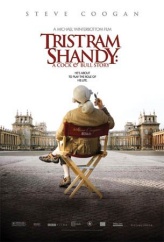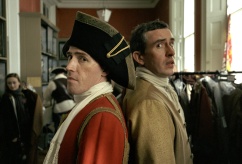Tristram Shandy:
A Cock and Bull Story |
| |
 |
Denmark/Sweden/Netherlands/France/Germany/USA, 2005. Rated R. 133 minutes.
Cast:
Steve Coogan, Rob Brydon, Shirley Henderson, Jeremy Northam, Naomie Harris, Kelly MacDonald, Stephen Fry, Gillian Anderson, Keely Hawes, Ian Hart, Kieran O'Brien, Dylan Moran, Roger Allam, Elizabeth Berrington
Writer: Martin Hardy
Original Music: Michael Nyman
Cinematography: Marcel Zyskind
Producer: Andrew Eaton
Director: Michael Winterbottom
LINKS
|
 his is a movie based on a novel most people said was unfilmable. The Life and Opinions of Tristram Shandy, Gentleman, ostensibly the autobiography of the titular character, is so full of the narrator's convoluted, irreverent digressions (many of them addressed directly to the reader) that it fails to advance beyond Shandy's birth—despite being nine volumes long! Written in the mid-1700s, Tristam Shandy was likely the first appearance in literature of the so-called unreliable narrator—the first-person storyteller whose subjective observations are so distorted that you cannot absolutely trust anything he says.
his is a movie based on a novel most people said was unfilmable. The Life and Opinions of Tristram Shandy, Gentleman, ostensibly the autobiography of the titular character, is so full of the narrator's convoluted, irreverent digressions (many of them addressed directly to the reader) that it fails to advance beyond Shandy's birth—despite being nine volumes long! Written in the mid-1700s, Tristam Shandy was likely the first appearance in literature of the so-called unreliable narrator—the first-person storyteller whose subjective observations are so distorted that you cannot absolutely trust anything he says.
Film presents an observable, objective reality within which the protagonist resides. That makes bringing an unreliable narrator novel to the screen difficult. Most films simply ignore the unreliable narrator (like adaptations of Lolita), or relegate their observations to voiceover (like Bridget Jones's Diary and High Fidelity). After all, you can't shoot a movie from inside a character's head.
Or can you? Any story that at some point tells you “It was all just a dream” is in essence an unreliable narrator film, because it has portrayed the protagonist's fantasies as real. This worked pretty well in The Wizard of Oz. Recently, however, films have experimented more freely. Mulholland Drive takes the “It was all just a dream” approach to a new level of complexity. In Michael Winterbottom's 24-Hour Party People, Tony Wilson, as portrayed by Steve Coogan, explains his story by talking directly to the camera on numerous occasions. (Both Tony Wilson and Steve Coogan appear in Tristram Shandy in a little inside joke.) American Splendor combines a fictionalized adaptation with the features of a documentary, incorporating both the real-life protagonist Harvey Pekar and the actor who plays him. Adaptation goes even further. As the film progresses, it becomes increasingly clear you are watching not the protagonist's objective reality, but rather the first draft of the screenplay he writes.

Rob Brydon (left) and Steve Coogan star in Michael Winterbottom's Tristram Shandy: A Cock and Bull Story. |
At their best, such films offer more profound character exploration and challenge the notion of objective truth. At their worst, no story ever emerges, the characters' observations fail to touch on any resonant concepts with which the audience might identify or at least sympathize, and nothing coheres. All you are left with is self-absorbed masturbation. Unfortunately, you can file Tristram Shandy under self-absorbed masturbation.
Usually, the biggest problem a screenwriter faces in adapting a novel is having too much material, and needing to cut to the essence of the story. In contrast, when Martin Hardy cut to the essence of The Life and Opinions of Tristram Shandy, Gentleman, the nine-volume novel came out to a thirty page screenplay. He and director Michael Winterbottom decided that the only way to be true to the spirit of a book largely about writing a book was to make a film largely about making a film.
Thus Tristam Shandy attempts to be a satire about the world of movies, weaving the present with the past, anachronistically and paradoxically. Coogan appears as himself, a contemporary actor, and as Shandy, the period narrator of the story, who quotes Groucho Marx and plays his own father in the film-within-the-film—which is, of course, impossible.
The film's director, Jeremy Northam (of Gosford Park and The Winslow Boy) , and the production staff wrestle with financiers and the difficult source material. Coogan worries about his footwear and the star quality of his nose, and pursues an attraction to his Fassbinder-loving assistant Jennie (Naomi Harris of 28 Days Later) while his girlfriend (Kelly Macdonald of Trainspotting and Gosford Park) and their six-month old child wait in his room. His co-star Rob Brydon (also a 24-Hour Party People vet), who plays Shandy's Uncle Toby, convinces himself he is the co-lead of the film and can't wait for his scenes with Gillian Anderson. Etcetera.
Unfortunately, no personalities stick out, and none of the satire cuts deep. Coogan/Shandy just seems weak and dull. He, like the other narcissistic characters, wander about haphazardly, not appearing to want anything in particular, and not doing or saying anything particularly unusual. Tristram Shandy is a thin slice of a not-very-interesting nothing.
At the end of this circular, self-referential, insiders' post-modern exercise, the cast and crew screen the movie they have made. Gillian Anderson's reaction is the best, but Jeremy Northam's criticism sounds loudest. “It's not funny,” he observes in surprise. You're supposed to think this is hilarious. You're supposed to think that it is the icing on a brilliant deconstruction of the filmmaking process. There's just one problem. Northam is absolutely right. Tristram Shandy isn't funny. As far as brilliant deconstructions go, there is nothing here you haven't already seen in Adaptation, The Player, Full Frontal, or American Splendor—to name but a few.
The book they said was unfilmable turns out to be a film that is unwatchable. If you've gotten this far, though, stick around a little longer. The funniest bit of the film is actually Coogan and Brydon's argument about Al Pacino over the end credits.
Review
© January 2006 by AboutFilm.Com and the author.
Images © 2006 Lions Gate Films. All Rights Reserved.


